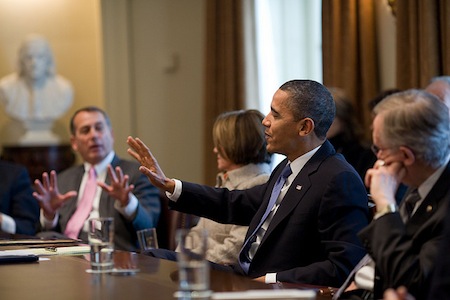Here in the United States, we’ve reached the final day before $85 billion in spending cuts take effect from sequestration (Ezra Klein really does provide ‘everything you need to know‘ in background, so I won’t waste your time with my own explanation). ![]()
For non-U.S. readers (or lazy Americans), here’s the issue in a nutshell: Back in 2011, the United States was nearing its debt limit ceiling — a totally idiosyncratic limit on the U.S. treasury incurring additional debt, regardless of whether the U.S. Congress has enacted spending necessitating the issuance of further debt. It’s so idiosyncratic that only Denmark has a similar mechanism.
Because the Republican Party won control of the U.S. House of Representatives in the 2010 midterm elections, negotiations between U.S. president Barack Obama and the U.S. Congress in summer 2011 were more fraught than usual over the debt ceiling. Partly, that’s because of the influence of the ‘tea party’ movement that boosted the ranks of House Republicans with anti-deficit legislators and that threatened the remaining House Republicans who cooperated too readily with the Democratic administration with primary challenges in future congressional elections (i.e., if you’re not conservative enough, we’ll put up someone who is: see, e.g., U.S. senator Bob Bennett, U.S. senator Dick Lugar).
So the solution was a last-minute agreement, which provided for a ‘supercommittee’ to recommend legislation to reduce the U.S. budget deficit by $1.2 trillion in the next decade. If that failed to result in a compromise (and of course it failed, and it failed way back in November 2011), lawmakers would be subject to around $85 billion in automatic across-the-board cuts (the ‘sequestration’), half of which would affect U.S. defense spending and half of which would affect U.S. domestic spending (though the cuts to domestic spending are, well, pretty much dumb from any point of view, economic or otherwise; that was the point, however — they were designed to be a negative incentive, even though Jeffrey Sachs today argues that the discretionary spending cuts are part of some grand Faustian Obama bargain).
No one really thought at the time the agreement was incredibly robust, and Standard and Poor’s responded by actually downgrading the United States’s credit rating from ‘AAA’ to ‘AA+.’
A short-term deal on New Year’s Eve 2012 — when lawmakers considered the so-called ‘fiscal cliff’ of both the scheduled increase of U.S. income taxes from Bush-era rates back to Clinton-era rates in addition to the sequestration cuts (among other austerity measures, such as the end of a holiday on the payroll tax) — achieved a compromise on tax rates, but pushed the sequestration issue until March 1.
That brings us up through today. Congressional Republicans and the Obama administration have reached no deal and, within the next 24 hours, $85 billion in cuts are supposed to go into effect through the U.S. federal government.
Predictably, the sequester has become an increasingly loud issues in the past week (Andrew Sullivan thinks the United States should just push forward with the sequester, U.S. Federal Reserve chairman Ben Bernanke thinks otherwise).
The problem as I see it, is that House Republicans realize both that they are the beneficiaries of:
- a classic hold-up situation*, insofar as a dysfunctional government hurts U.S. president Barack Obama more than it hurts 535 disparate members of Congress — that becomes more true as the executive branch has gained more power (no matter how many times the Obama administration sends poor U.S. transportation secretary Ray LaHood out in front of the cameras to protest there’s simply not enough money for the U.S. government to process airport security in a timely manner), and
- a game of chicken** where the Republicans start off with a steering wheel that’s already four-fifths ripped off the car, due to the increased polarization of Congress (in no small part because of ideological purity tests that threaten incumbents with primary contests) and the increased insularity of Congressional districts (in no small part because of the decennial gerrymandering of those districts).
What’s fascinating about this situation — and what makes it so interesting to me in the world of non-U.S. politics as well — is that there are plenty of hold-up situations in international politics (e.g., basically everything that’s happened in the Doha round of negotiations in the World Trade Organization since 2001) and plenty of games of chicken (e.g., basically, take your pick of every dodgy election and subsequently contested result in the past decade from Kenya to Georgia), but it’s rare to see them combined in the same policymaking frankenstorm. Continue reading What game theory tells us about the sequester showdown
